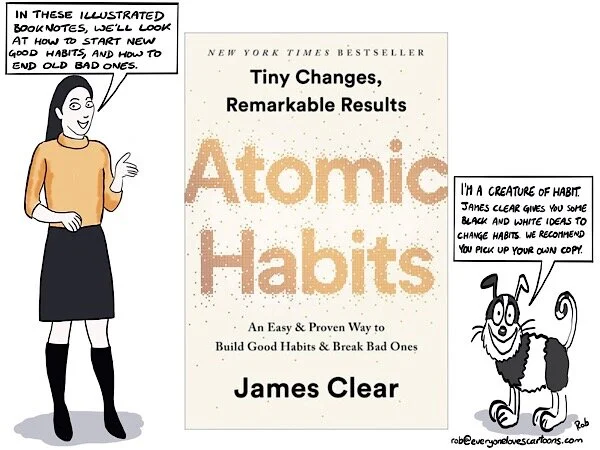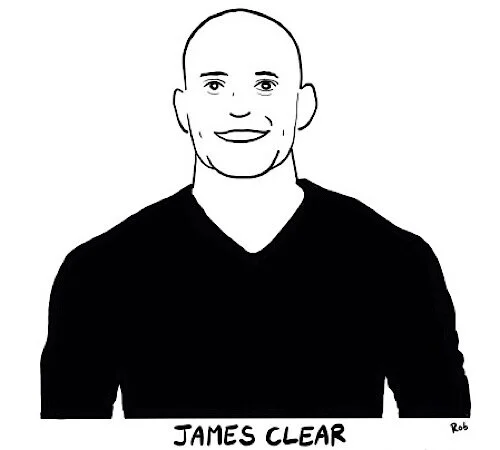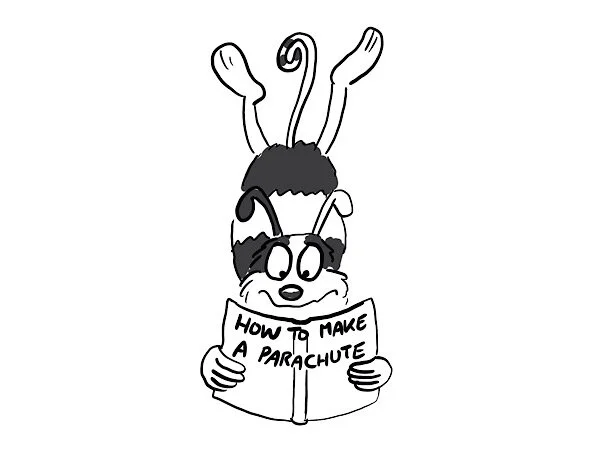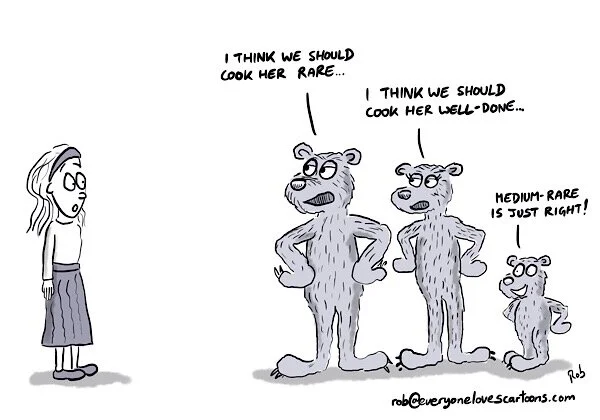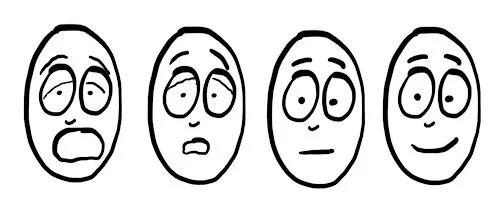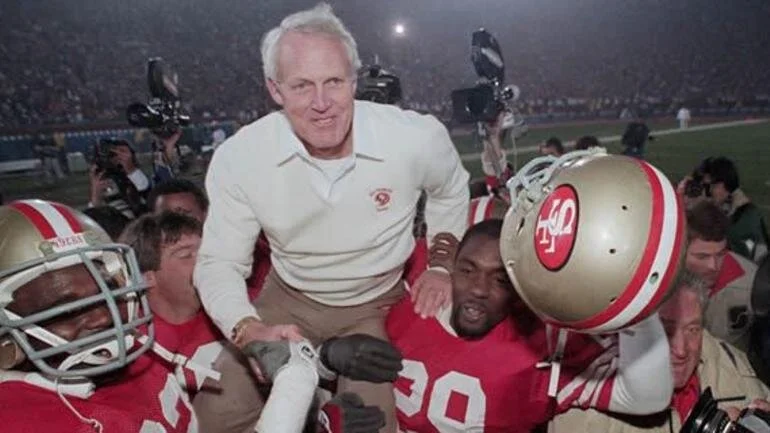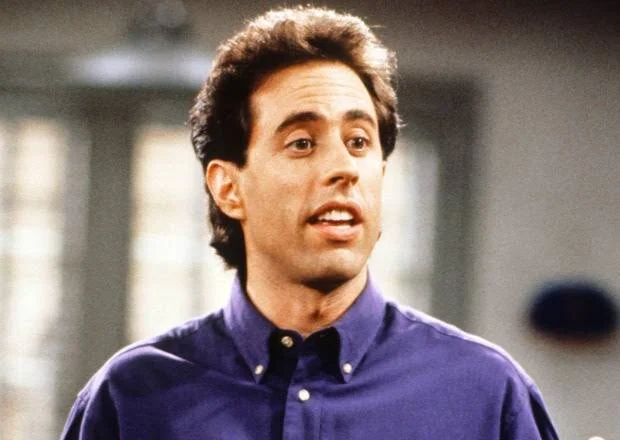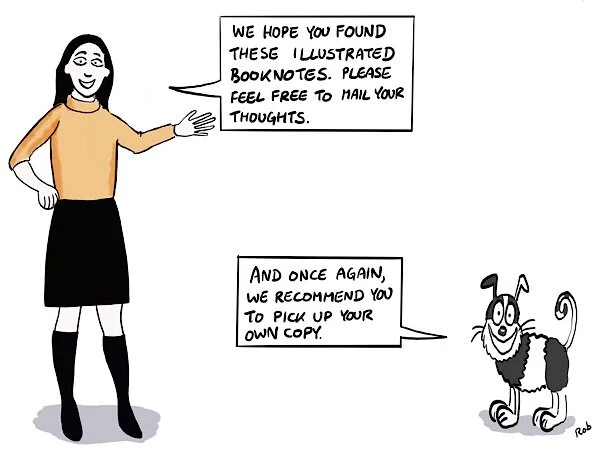Every month I put together a series of Illustrated Booknotes on books that I’ve read and are useful to me.
This month we’re looking at Atomic Habits by James Clear, one of the best guides on habit change there is.
I highly recommend you pick up your own copy of ‘Atomic Habits’
How to use these booknotes
The book will give you a roadmap to follow when working through habits.
For these booknotes, I would recommend taking one or two points that stick with you, and then trying to put them into practice. As with anything, unless you try it out for yourself, reading alone won’t take you anywhere.
These booknotes are listed in the order I read them. I selected them because they resonated with me.
And now, the booknotes…
Breakthrough moments are often the result of many previous actions, which build up the potential required to unleash a major change.
Habits often appear to make no difference until you cross a critical threshold and unlock a new level of performance. In the early and middle stages of any quest, there is often a Valley of Disappointment. You expect to make progress in a linear fashion and it’s frustrating how ineffective changes can seem during the first days, weeks, and even months. It doesn’t feel like you are going anywhere. It’s a hallmark of any compounding process: the most powerful outcomes are delayed.
This is one of the core reasons why it is so hard to build habits that last. People make a few small changes, fail to see a tangible result, and decide to stop. You think, “I’ve been running every day for a month, so why can’t I see any change in my body? Once this kind of thinking takes over, it’s east to let good habits fall by the wayside. Bit in order to make meaningful a difference, habits need to persist long enough to break through this plateau - what I call the Plateau of Latent Potential.
Your work was not wasted; it is just being stored. All the action happens at thirty-two degrees.
When you you finally break though the Plateau of Latent Potential, people will call it an overnight success. The outside world only sees the most dramatic event rather than all that preceded it. But out know that it’s the work you did long ago - when it seemed that you weren’t making any progress that makes the jump today possible.
Forget about goals, focus on systems instead
The purpose of setting goals is to win the game. The purpose of building systems is to continue playing the game. True long-term thinking is goal-less thinking. It’s not about any single accomplishment.. It is about the cycle of endless refinement and continuous improvement. Ultimately, it is your commitment to the process that will determine your progress.
You do not rise to the level of your goals. You fall to the level of your systems.
Changing our habits os challenging for two reasons: 1. We try to change the wrong thing and 2. We try to change our habits in the wrong way.
The ultimate form of intrinsic motivation is when a habit becomes part of your identity. It’s one thing to say I’m the type of person who wants this. It’s something very different to say I’m the type of person who is this.
Many people walk through life in a cognitive slumber, blindly following the norms attached to their identity.
The more you repeat a behaviour , the more you reinforce the identity associated with that behaviour. In fact, the word identity was originally derived from the Latin words essentials, which means being, and identified, which means repeatedly. Your identity is literally your “repeated beingness.”
Each habit not only gets results but also teachers you something far more important: to trust yourself. You stat to believe you can actually accomplish these things. When the votes mount up and the evidence begins to change, the story you tell yourself begins to change as well. Of course, it works the opposite way, too. Every time you choose to perform a bad habit, it’s a vote for that identity.
You good news is that you don’t need to be perfect. In any election, there are going to be votes for both sides. You don’t need a unanimous vote to win an election; you just need a majority. It doesn’t matter if you cast a few votes for a bad behaviour or an unproductive habit. Your goal is simply to win the majority of the time.
True question is: “Are you becoming the type of person you want to become?” The first step is not what or how, but who. You need to know who. You want to be. Otherwise, your quest for change is like a boat without a rudder.
You have the power to change your beliefs about yourself. Your identity is not set in stone, You have a choice in every moment. You can choose the identity you want to enforce today with the habits you choose today.
Ultimately, your habits matter because they help you become the type of person you wish to be. They are the channel through which you develop your deepest beliefs about yourself. Quite literally, you become your habits.
If a habit remains mindless, you can’t expect to improve it. As the psychologist Carl Jung said. “Until you make the unconscious conscious, it will direct your life and you will call it fate.”
One of our greatest challenges in changing habits is maintaining awareness of what we are actually doing.
If you’re still having trouble determining how to rate a particular habit, here is a question I like to use: “Does this behaviour help me become the type of person I wish to be? Does this habit cast a vote for or against my desired identity? Habits that reinforce your desired identity are usually good. Habits that conflict with your desired identity are usually good.
The best way to start a new habit
An implementation intention - a plan you make beforehand about when and where to act. That is, how you intend to implement a particular habit.
When situation X arises, I will perform response Y
Many people think they lack motivation when what they really lack is clarity. It is not always obvious when and where to take action. Some people spend their entire lives waiting for the time to be right to make an improvement.
When your dreams are vague, it’s easy to rationalise little exceptions all day long and never get around to the specific things you need to do to succeed.
The habit stacking formula is:
“After [CURRENT HABIT], I will [NEW HABIT].”
Habit stacking allows you to create a set of simple riles that guide your future behaviour. It’s like you always have a game plan for which action should come next.
Motivation is overrated; Environment often matters more
Environment design allows you to take back control and become the architect of your life. Be the designer of your world and not merely the consumer of it.
Instead of summoning a new dose of willpower whenever you want to do the right thing, your energy would be better spent optimising your environment. This is the secret to self-control. Make the cues of your good habits obvious and the cues of your bad habits invisible.
Your brain has far more neural circuitry allocated for wanting rewards than for liking them.
We need to make our habits attractive because it is the expectation of a rewarding experience that motivates us to act in the first place.
The more attractive an opportunity is, the more likely it is to become habit-forming.
We imitate the habits of three groups in particular:
The close
The many
The powerful
We soak up the qualities and practices of those around us.
One of the most effective things you can do to build better habits is to join a culture where your desired behaviour is the normal behaviour. New habits seem achievable when you see others doing them everyday.
Surround yourself with people who have the habits you want to have yourself. You’ll rise together.
Action, on the other hand, is the type of behavior that will deliver an outcome.
If motion doesn’t lead to results, why do we do it? So,times we do it because we actually need to plan or learn more. But more often than not, we do it because motion allows us to feel like we’re making progress without running the risk of failure. Most of us are experts at avoiding criticism. It doesn’t feel good to fail or to be judged publicly, so we tend to avoid situations where that might happen. And that’s the biggest reason why you slip into option rather than taking action: you want to delay failure.
It’s easy to be in motion and convince yourself that you’re still making progress. You think, “I’ve got conversations going with four potential clients right now. This is good. We’re moving in the right direction.”
Motion feels like you’re getting things done. But really, you’re just preparing to get something done. When preparation becomes a form of procrastination, you need to change something. You don’t want to be merely planing. You want to be practicing.
How can we design a world where it’s easy to do what’s right? Redesign your life so the actions. That matter the most are also the actions that are easiest to do.
The truth is, a habit must be established before it can be improved.
The more you ritualise the beginning of a process, the more likely it becomes that you can slip into the state of deep focus that is required to do great things.
If you show up at the gym five days in a row - even if it’s just for two minutes - you are casting votes for your new identity. You’re not worried about getting in shape. You’re focused on becoming the type of person who doesn’t miss workouts. You’re taking the smallest action that confirms the type of person you want to be.
A commitment device is a choice you make in the present that controls your actions in the future.
Ulysses pact.
Named after Ulysses, the hero of The Odyssey, who told his sailors to tie home to the mast of the ship so that he could hear the enchanting song of the Sirens but wouldn’t be able to steer the ship toward them and crash on the rocks. Ulysses realized the benefits of locking in your future actions while your mind is in the right place rather than waiting to see where your desires take you in the moment.
By utilizing commitment devices, strategic one-time decisions, and technology, you can crate an environment of inevitability - a space where good habits are not just an outcome you hope for but an outcome that is virtually guaranteed.
The ending of any experience is vital because we tend to remember it more than other phases. You want the ending of your habit to be satisfying.
It can be challenging to stick with habits like “no alcohol this month” because nothing happens when you skip happy hour drinks. It can be hard to feel satisfied when there is no action in the first place. All you’re doing is resisting temptation, and there isn’t much satisfying about that.
When the consequences are severe, people learn quickly.
We repeat bad habits because they serve us in some way, and that makes them hard to abandon. The best way I know to overcome this predicament is to increase the speed of the punishment associated with the behaviour. There can’t be a gap between the action and the consequences.
As soon as actions incur an immediate consequence, behaviour begins to change.
People get so caught up in the fact that they have limits that they rarely exert the effort required to get close to them.
Until you work as hard as those you admire, don’t explain away their success as luck.
The Goldilocks Rule
The Goldilocks Rule states that humans experience peak motivation when working on tasks that are right on the edge of their current abilities. Not too hard. Not too easy. Just right.
Mastery requires practice. But the more you practice something, the more boring and routine it becomes. Once the beginner gains have been made and we learn what to expect, our interest starts to fade.
The greatest threat to success is not failure but boredom.
We get bored with habits because they stop delighting us. The outcome becomes expected. And as our habits become ordinary, we start derailing out progress to seek novelty. Perhaps this is why we get caught up in a never-ending cycle, jumping from one workout to the next, one diet to the next one business idea to the next. As soon as we experience the slightest drop in motivation, we begin seeking a new strategy - even if the old one was still working.
“Men desire novelty to such an extent that those who are doing well wish for a change as much as those who are doing badly.” - Machiavelli
No habit will stay interesting forever. At some point, everyone faces the same challenge on the journey of self-improvement: you have to fall in love with boredom.
The only way to become excellent is to be endlessly fascinated by doing the same thing over and over. You have to fall in love with boredom.
Habits create the foundation for mastery. In chess, it is only after the basic movements of the pieces have become automatic that a player can focus on the next level of the game. Each chunk of information that is memorised opens up the mental space for more effortful thinking. This is true for any endeavor. When you know the simple movements so well that you can perform them without thinking, you are free to pay attention to more advanced details.
If you’re having trouble changing your habits, the problem isn’t you. The problem is your system. Bad habits repeat themselves again and again not because you don’t want to change, but because you have the wrong system for change.
Now for the interesting question: If you completely ignored your goals and focused on your system, would you still succeed? For example, if you were a coach and you ignored your goal to win a championship and focused only on what your team does at practice each day, would you still get results?
In the words of three-time Super Bowl winner Bill Walsh, “The score takes care of itself.”
Jerry Seinfeld uses a habit tracker to stick with his streak of writing jokes. He explains that his goal is simply to “never break the chain” of writing jokes every day. In other words, he is not focused on how good or bad a particular joke is or how inspired he feels. He is simply focused on showing up and adding to his streak.
HABITS + DELIBERATE PRACTICE = MASTERY
If you’re having trouble changing your habits, the problem isn’t you. The problem is your system. Bad habits repeat themselves again and again not because you don’t want to change, but because you have the wrong system for change.
What’s next:
I put out a daily cartoon newsletter with a wide variety of cartoons and characters, along with occasional cartooning tips.
Add your name and mail to the orange box below and I’ll wing a copy your way.

